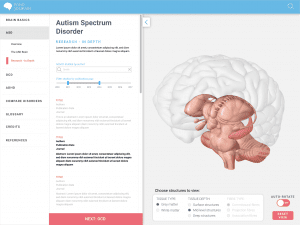The CAN-ACN advocacy committee is proud to announce that Midori Nediger is the winner of a 2017 Neuroscience Advocacy Award for her project to develop an online interactive brain model to improve public understanding of neurodevelopmental disorders, with support from the Province of Ontario Neurodevelopmental Disorders (POND) Network, called POND 3D brain. The committtee was impressed with the originality of the project, and its potential to advance public neuroscience literacy, improve the accessibility of neuroscience research, and reduce the stigma surrounding neurodevelopmental disorders.
About Midori Nediger

Midori Nediger received her bachelor’s degree in Life Sciences at McMaster University. She is currently pursuing a master’s degree in Biomedical Communication at the University of Toronto. As an aspiring biomedical communicator, Midori combines scientific knowledge with principles of communication design to produce engaging didactic tools. In her second year of the Biomedical Communications program, Midori is focused on designing tools that educate non-scientific audiences on complex topics in the health sciences. She strives to identify gaps in public knowledge and leverage the strengths of new technologies to create learning tools that fill those gaps. She believes that science visualization specialists play a critical role in facilitating knowledge transfer between scientists and non-scientists.
POND 3D Brain – An online interactive brain model to improve public understanding of neurodevelopmental disorders
Project Description

POND 3D Brain aims to advance public neuroscience literacy, improve the accessibility of neuroscience research, and reduce the stigma surrounding neurodevelopmental disorders. It will be a freely available web-based learning environment that will feature three-dimensional brain models to help users understand the neurobiological basis of neurodevelopmental disorders.
Neurodevelopmental disorders (NDDs), including autism spectrum disorder (ASD), obsessive-compulsive disorder (OCD), and attention-deficit hyperactivity disorder (ADHD), are a group of brain disorders marked by social, language, motor, and cognitive disabilities. Current neuroscience research is of particular relevance to those affected by neurodevelopmental disorders (NDDs), but a public deficit of neuroscience literacy prevents this demographic from accessing this information through the scientific literature. The main goal of the project is to provide an accessible learning tool which can be used by parents of children affected by NDDs to gain a deeper understand of their child’s behaviour.
The project will comprise two main components:
- an introduction to the basic structure and function of a typical brain, and
- descriptions and visual representations of the neurobiological basis ASD, ADHD, and OCD, based on current research.
The three-dimensional brain models will be used both to depict typical brain anatomy and to display information about changes in the brain seen in these specific NDDs. Users will be encouraged to interact with the models, providing an engaging and immersive experience.
The project is being designed and built as part of a Master’s Research Project by Midori Nediger, a graduate student in the Biomedical Communications program at the University of Toronto. The project is supported by the Province of Ontario Neurodevelopmental Disorders (POND) Network, who hope to further develop the application to provide an educational resource to their stakeholders in the public.
The CAN advocacy committee wishes to congratulate Midori Nediger !
